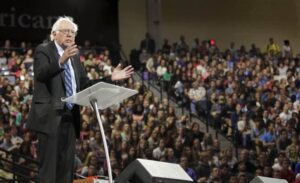Yesterday I watched the self-proclaimed not-particularly-religious Bernie Sanders address thousands of evangelical students at Liberty University, my alma mater (class of 2005). His appeal was to a “common ground” of justice, even quoting Amos as evidence of their common goal.
For every moment of applause there were just as many moments of silence, or worse, the claps of the 10 people in a sea of thousands. And in those moments of near silence, I kept thinking of the immense social pressure so many evangelicals are under not to be associated with someone like Sanders, not to be seen agreeing with much of anything he might have to say even if he’s quoting the Bible.
Around 7 years ago, a colleague preached a sermon on Genesis at a church where I pastored. He presented the possibility that Genesis might allow for creation and evolution to co-exist. A member of my congregation almost charged me after the sermon, his face bright red, and his lips pursed like a gate holding back the rant that was dying to escape.
After sitting down with him for a few hours over a cup of coffee, it was clear that his anger came because deep down he had his own doubts but nowhere to go with them. He was angry at himself for doubting. He was angry at his parents and spouse for not being a safe place to doubt. He was angry at us for stoking his doubt. But behind all that anger, he was afraid.
And his primary fear was this: how would his doubt change his relationships?
Would he be invited over to his sister’s house if he believed in evolution?
Would his parents still come over as often to spend time with their grandkids?
Would his wife think he is a weak Christian, backsliding in his faith?
His story is representative of dozens I had over the years as a pastor. And this experience has led me to think that we might start believing beliefs because we think they are true but more often than not we have a lot of social pressure to keep believing them, afraid of how change of beliefs might affect relationships.
This has been reinforced so often in these conversations that now when someone comes to me with doubts about their current set of beliefs and asks for a cup of coffee and some words of wisdom, I almost always begin by asking them to name the social consequences if they change their beliefs.
And almost always, there’s a story to be told and fears to be confessed. As much as we wish it weren’t the case, our beliefs aren’t just personal. They are social. They are communal. They help us feel like we belong when we align with our tribe and they cause us to feel alone when we come to differ.
Perhaps there are many points to be made here about what it means that so many churches have become an unsafe place for doubt. But, for me, as I watched the crowd listening to Bernie Sanders, my hope was that I can become more gracious and patient with those who believe differently than me. For most, it’s not as simple as a change of belief. There is much at stake if they change their mind.
